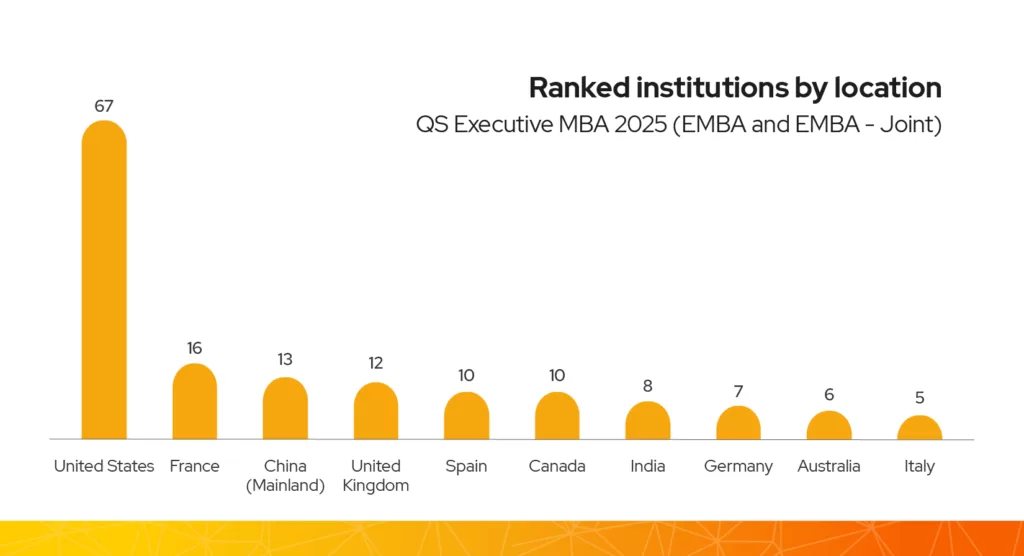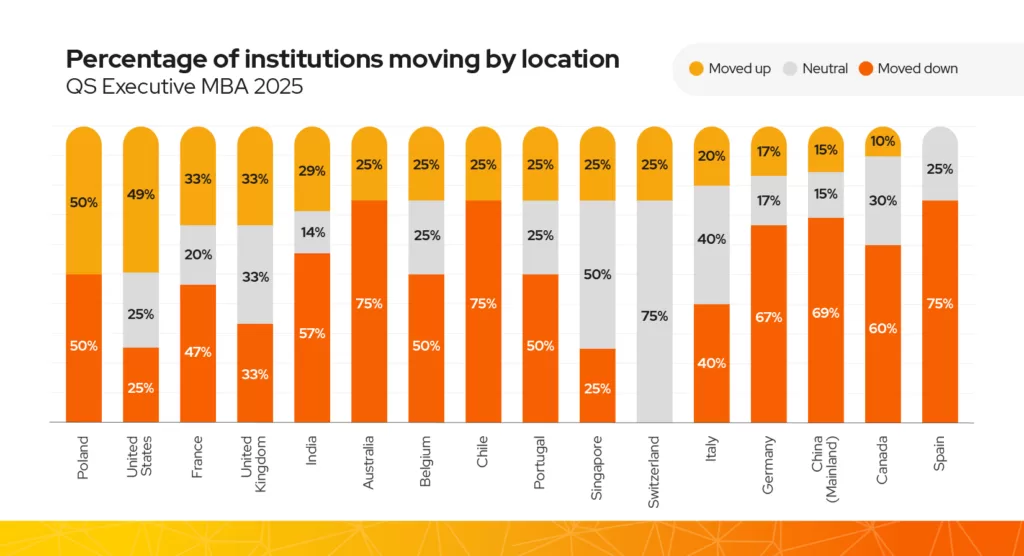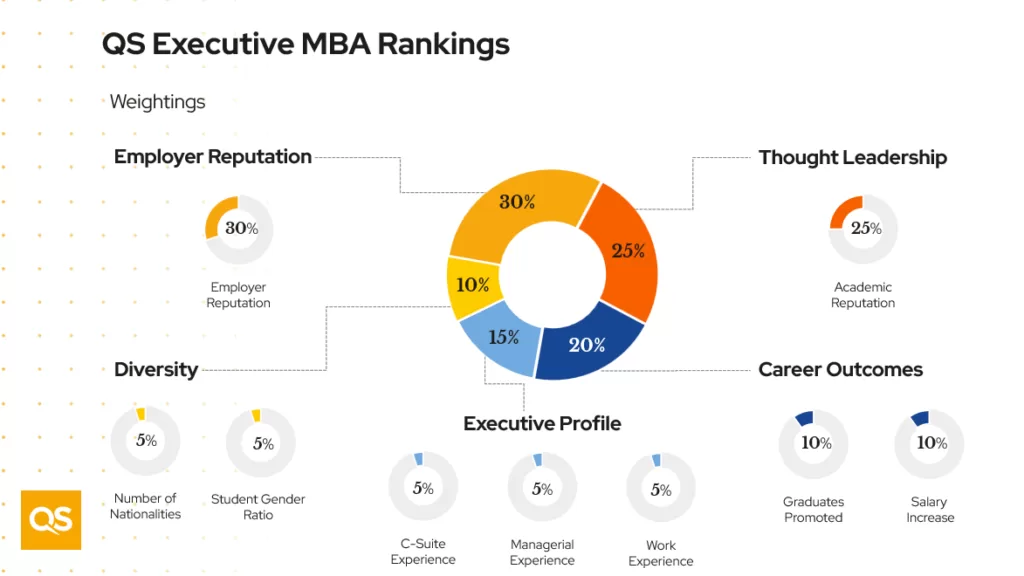The QS Executive MBA Rankings 2025 are now live. Get the full results on TopMBA.com.
The top 10 institutions in the QS Executive MBA Rankings 2025
- University of Oxford (Saïd), UK
- HEC Paris, France
- IESE Business School, Spain
- MIT (Sloan), US
- London Business School, UK
- Yale School of Management, US
- Penn (Wharton), US
- Northwestern (Kellogg), US
- INSEAD, France
- Warwick Business School, UK
The University of Oxford’s Saïd Business School maintained its position at the top of the global table. Warwick Business School has risen five places and reaches the top 10, primarily driven by improvements in Employer Reputation. Yale School of Management, which moved up two places, has climbed because of improvements in our Mean Work Experience and Student-Gender Ratio indicators.

The US is by far the most represented location, with more ranked institutions than France, China, the UK, Spain and Canada combined.
Of our 14 newly ranked institutions, the University of Sydney Business School is the top performer. With a strong Executive Profile Score, the School ranks 33 in the world and six in Asia Pacific.
Top 5: Joint programmes
1. TRIUM (HEC/LSE/NYU)
2. UCLA/NUS
3. Tsinghua/INSEAD
4. EMBA-Global Americas & Europe (Columbia/LBS)
5. IE-Brown Executive MBA
Top 5: Asia Pacific
1. National University of Singapore Business School, Singapore
2. Nanyang Business School, Singapore
3. Melbourne Business School, Australia
4. SMU (Lee Kong Chian), Singapore
5. UNSW (AGSM), Australia
Top 5: Europe
1. University of Oxford (Saïd), UK
2. HEC Paris, France
3. IESE Business School, Spain
4. London Business School, UK
5. INSEAD, France
Top 5: Latin America
1. Pontificia Universidad Católica de Chile, Chile
2. EGADE Business School, Mexico
3. Universidad de Chile, Chile
4. INCAE Business School, Costa Rica
5. FIA Business School, Brazil
Top 5: Middle East and Africa
1. UCT Graduate School of Business, South Africa
2. University of Pretoria (Gibs), South Africa
=3. American University of Beirut (AUB), Lebanon
=3. KFUPM Business School, Saudi Arabia
5. AUC School Of Business (Cairo), Egypt
Top 5: North America
1. MIT (Sloan), US
2. Yale School of Management, US
3. Penn (Wharton), US
4. Northwestern (Kellogg), US
5. Berkeley (Haas), US
Global trends

Alongside the US having the most institutions, we have seen improvement for nearly half of their institutions. None of the other locations with ten or more ranked institutions had more institutions improve their rank than move down – the UK had the same amount move up and down.
QS Executive MBA ranking methodology
Executive MBA programmes are designed for students who are already pursuing a business career and want to combine full-time work with education. Our bespoke methodology seeks to highlight programmes that have strong links to industry, positive career returns, and offer good value for money.

Learn more about the methodology
Personas to drive action
To help institutions use rankings to improve institutional performance, our expert consultants have created institutional personas per indicator.
Employer Deficit
Using the Career Outcomes and Employer Reputation metrics, we can see institutions in the Employer Deficit persona. Career Outcomes is designed to show how well the programme can help develop a graduate's career, making it a key lens for international students.
Institutions with an Employer Deficit have a Career Outcomes score that is significantly higher than their Employer Reputation score. In the QS Executive MBA Rankings 2025, there are 44 institutions in the Employer Deficit persona. This persona suggests that the institution is delivering tangible career results but needs to tell its story in a more compelling way, directly to employers.
Typically, those in the Employer Deficit person attract experienced and diverse cohorts, but also need to improve their Academic Reputation score, again highlighting an opportunity for institutions to better reach key stakeholders. The highest Academic Reputation score in this group is 50 out of 100, with 64% of institutions scoring 30 or less. European institutions are represented disproportionately in this group, making up 50% of institutions in the Employer Deficit persona. Only 16% come from the United States.
Whichever metrics your institution would like to focus on, QS experts can provide actionable recommendations for success. For more information contact us.
Progression Deficit
With the Career Progression score, we can also compare it to the Diversity metric. Institutions in the Progression Deficit persona attract a diverse cohort, but don’t consistently ensure strong career outcomes.
The institutions in this persona also typically have lower scores in Academic Reputation with 79% scoring less than 50 out of 100. 35% of the institutions in this persona are in the top 100, with 3 in the top 50.
On the other hand, Class Profile is an area of strength for those in this persona, with these institutions typically attracting students with high levels of work and managerial experience. Over 70% of institutions in the Progression Deficit persona score above 70 out of 100 for both these indicators, and when it comes to Work Experience, 50% score over 80.
Take a data-driven approach to your strategic thinking and get recommendations from expert consultants.









.jpeg)









